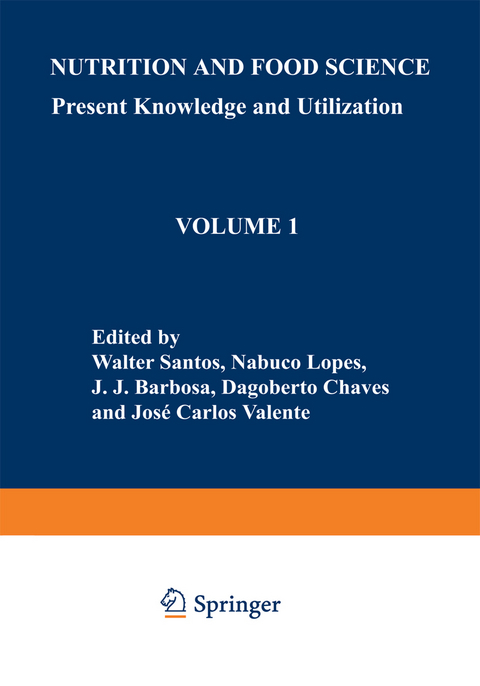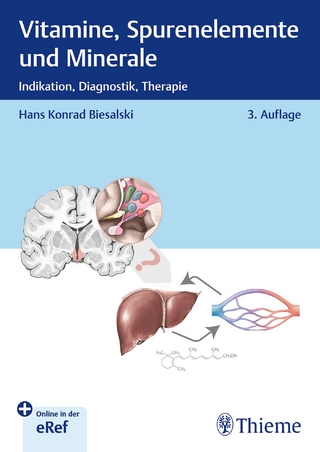
Nutrition and Food Science: Present Knowledge and Utilization
Springer-Verlag New York Inc.
978-1-4684-1032-7 (ISBN)
Section I Planning and Implementation of National Programs.- Nutrition Within Development.- Incorporating Nutrition Goals into National Intersectorial Planning — The Issues.- National Food and Nutrition Planning and Policies: Some Cautionary Comments.- Incorporating Nutritional Goals into Agricultural Sector Planning.- Incorporating Nutrition Goals into Health Sector Planning.- The Politics of Nutrition: An Agenda for Action.- Impact of the Energy Crisis on Food and Nutrition Systems.- Nutrition Planning at Community Level: The Colombian Experience.- Chilean Experience: Planning and Implementation of National and Nutritional Programs.- Multisector Factors Affecting Nourishment and Nutrition.- Reflections on a Food and Nutrition Policy.- Tamilnadu Nutrition Project — An Approach to Integrated Planning.- Planning and Implementation of National Food and Nutrition Policies and Programs. The Brazilian Experience: The National Food and Nutrition Program, II Pronan.- Impact of Government Development Policies and Programmes of Food and Nutrition Sector: the Indian Experience.- Section II The Role of International and Non-Governmental Agencies.- The Role of the International Development Bank in Nutrition.- Activities of the World Food Council for the Improvement of the World Food Situation.- Nutrition and the Role of the International Fund for Agricultural Development.- The World Food Situation.- New Institutional Arrangements for Nutrition in the United Nations System.- Victory Against Hunger.- Nutrition and Hunger: Can the Voluntary Agencies Meet the Challenge?.- Section III The Role of the Private Sector.- Private Sector.- The Role of Private Enterprise in the Solution of Food and Nutritional Problems.- Viewpoints of Agro-industrial Enterprise on the Solution to the FoodProblem.- Freedom from Malnutrition and Disease — the Contribution of Amino-acids.- Contribution of the Small Farmers in the Solution of Malnutrition in Latin America and the Caribbean: Possibilities of Associative Enterprises.- Section IV Program Evaluation and Nutritional Surveillance.- Evaluation, an Imperative Responsibility in Nutrition Intervention Programs.- Impediments and Requirements of Nutrition Evaluation.- Conceptual Elements of the Evaluation of the Nutrition Project Brazil/IBRD.- Health-related Components of a Nutritional Surveillance System.- Agricultural and Economic Components of Nutritional Surveillance.- Operationalization of Food and Nutrition Surveillance Systems: Experiences and Methodological Advances.- The Use of Surveillance Systems for Early Warning of Disasters.- Nutrition Surveillance in the United States.- Food and Nutrition Surveillance System in Ethiopia.- Nutrition Surveillance: Lessons from a Pilot Project, Philippines.- Nutritional Surveillance — Initial Experience in Sri Lanka.- Nutrition Surveillance Systems — The Yugoslav Experience.- Section V Nutrition Intervention Programs for Rural and Urban Areas.- Maximizing Nutritional Output of Small Farms.- Nutrition Intervention Programs for Rural Areas: African Experiences.- Public Health Program to Promote Nutrition in Rural Areas — Thailand Experience.- Agricultural Planning and Policy to Improve Nutrition for the Rural Poor — The Tanzanian Experience.- Role of Home Science in Motivating Women to Participate in and Benefit from Programs which Promote Rural Nutrition.- Socio-Economic Factors in the Nutrition of the Rural Poor.- Nutrition Intervention in Low Income Rural Areas.- U.S. Food Programs for People at Low Socioeconomic Level.- Functional Literacy in Integrated ChildCare in India.- S.N. Chaudhuri and Amit Dasgupta Feeding Programmes — Base for Integrated Services.- Results of a Community Nutritional Programme as Part of a Comprehensive Cardiovascular Control Program (the North Karelia Project).- Nutrition Strategies: Fortification of Monosodium Glutamate.- Dietary Deficit of Vitamin A in Population: Approaches to Correct it.- Strategies for the Prevention of Vitamin A Deficiency.- Characterization of Vitamin A Deficiency and Design of Intervention Programs.- Mass Distribution of Vitamin A for the Prevention of Xerophthalmia.- Vitamin A Deficiency — Ongoing Programs. Private Agencies.- Section VI Mass Feeding Programs.- Recommendations on Famine-Dealing with Nutrition and Relief Operations in Times of Disaster.- School Feeding: Problems and Prospects.- Mass Feeding Programs.- Workers’ Feeding Programs in Poland.- Feeding Programme: Experience in Thailand.- Mass Feeding.- Fiscal Incentives for Worker Feeding in Brazil.- Institutional Feeding for the Worker.- Industrial and School Canteens in Western Society Critical Quantitative and Qualitiative Evaluation.- Electronic Data Processing in Food Service Management.- Section VII Consumer Protection Programs.- Food Problems and Consumer Protection.- The Nutrition Program of the U.S. Food and Drug Administration (FDA).- Strengthening of Food Control Services in Zambia — A Case Study.- Food Management for Protection of Consumer Interests.- Contributors.
| Zusatzinfo | XIII, 808 p. |
|---|---|
| Verlagsort | New York, NY |
| Sprache | englisch |
| Maße | 178 x 254 mm |
| Themenwelt | Medizin / Pharmazie ► Gesundheitsfachberufe ► Diätassistenz / Ernährungsberatung |
| Naturwissenschaften ► Biologie ► Biochemie | |
| ISBN-10 | 1-4684-1032-6 / 1468410326 |
| ISBN-13 | 978-1-4684-1032-7 / 9781468410327 |
| Zustand | Neuware |
| Haben Sie eine Frage zum Produkt? |
aus dem Bereich


